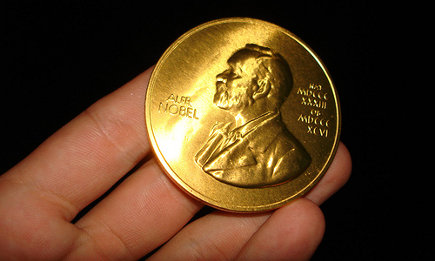Nobel noodkreet aan Europa

In een open brief aan de leiders van de Unie wijzen zij op detweesprong waar de EU nu voor de komende toen tot twintig jaar voorstaat. De Lissabon-doelstellingen voor 2010 zijn niet gehaald. Denieuwe meerjarenbegroting 2014-2020 moet dus de onvermijdelijkeconclusies trekken uit die “nobele ambities” van toen die niet zijngehaald. Er moet een tandje bijgezet worden, ook gelet op deverhoogde inzet bij andere wereldmaachten.
“Europe can ill afford to lose its best researchers andteachers, and would gain greatly by attracting foreign talent.Reducing the funding available for excellent research means asmaller number of trained researchers. In case of a severereduction in the EU research and innovation budget we risk losing ageneration of talented scientists just when Europe needs themmost.”
Veel belovend, maar….
Het feitelijke perspectief achten zij zeer positief en veelbelovend. De Europese Onderzoeksruimte is in hoog tempo eenonverwacht groot succes geworden. Men zorgt nu samen voor veel meerimpact dan kon worden gehoopt: “Excellent people, excellentprojects. It valuably complements national funding of fundamentalresearch. Funding research at EU level is a catalyst to make betteruse of the resources we have and make national budgets moreefficient and effective. These EU resources are extremelyprecious.”
Op de Eurotop eind november moeten de grote lijnen voor hetmeerjarenbudget in de steigers staan. De Nobelwinnaars vragendaarom hoe zwaar de Europese leiders hun visie van een blijvende,leidende rol van Europa als kenniscentrum en innovatieve kracht inde wereld zullen willen doen wegen. “Europe is at the forefront ofscience in many areas. Transforming this knowledge into innovativenew products, services and industries is the only way to provideEurope with a competitive edge in today’s rapidly changing globallandscape and to ensure Europe’s long-term futureprosperity.”
U leest de volledige brief van de Nobellaureatenhier
To the Heads of State or Government of EU Countries, Presidentsof EU Institutions,
It is often said that every crisis also presents an opportunity.The current crisis forces us to make choices, and one of thosechoices is about science and its support. Back in the year 2000,you and your predecessors set yourselves the target of becoming the”world’s most dynamic knowledge-based economy by 2010″. Theintention was ambitious and noble, but the goal has yet to beachieved.
Science can help us find answers to many of the pressingproblems facing us at this time: new ways to harness energy, newforms of production and products, improved ways to understand howsocieties function and how we might order them better. We are justat the start of a revolutionary new understanding of how our ownbodies work with incalculable consequences for our future healthand longevity.
Europe is at the forefront of science in many areas.Transforming this knowledge into innovative new products, servicesand industries is the only way to provide Europe with a competitiveedge in today’s rapidly changing global landscape and to ensureEurope’s long-term future prosperity.
Knowledge knows no boundaries. The global market for outstandingtalent is highly competitive. Europe can ill afford to lose itsbest researchers and teachers, and would gain greatly by attractingforeign talent. Reducing the funding available for excellentresearch means a smaller number of trained researchers. In case ofa severe reduction in the EU research and innovation budget we risklosing a generation of talented scientists just when Europe needsthem most.
In this regard, the European Research Council has achievedglobal recognition in a remarkably short time. It funds the bestresearchers anywhere in Europe regardless of nationality: Excellentpeople, excellent projects. It valuably complements nationalfunding of fundamental research.
Funding research at EU level is a catalyst to make better use ofthe resources we have and make national budgets more efficient andeffective. These EU resources are extremely precious. They haveproven to be capable of achieving essential benefits for Europeanscience as well as increasing returns to society and increasinginternational competitiveness.
It is essential that we support, and even more importantly,inspire in a pan-European way the extraordinary wealth of researchand innovation potential that exists all over Europe. We areconvinced that the younger generation of researchers will also makeits voice heard – and you should listen to what they have tosay.
Our question to you, the Heads of State or Government andPresidents meeting in Brussels on 22-23 November to discuss the EUbudget for 2014-2020, is a simple one: when the deal for Europe’sfuture budget is announced, what will be the role of science inEurope’s future?
Signed by Nobel Prize and Fields Medal winners
Sidney Altman, Werner Arber, Robert J. Aumann, FrancoiseBarré-Sinoussi, Günter Blobel, Aaron Ciechanover, ClaudeCohen-Tannoudji, Johann Deisenhofer, Richard R.Ernst, Gerhart Ertl,Sir Martin Evans, Albert Fert, Andre Geim, Serge Haroche, AvramHershko, Jules A. Hoffmann, Roald Hoffmann, Sir Tim Hunt, Eric R.Kandel, Klaus von Klitzing, Sir Harold Kroto, Finn Kydland,Jean-Marie Lehn, Eric S. Maskin, Dale T. Mortensen, Erwin Neher,Konstantin Novoselov, Christiane Nüsslein-Volhard, VenkatramanRamakrishnan, Richard J. Roberts, Heinrich Rohrer, Bert Sakmann,Bengt I. Samuelsson, John E. Sulston, Jack W. Szostak, Sir John E.Walker, Ada E. Yonath, Rolf Zinkernagel, Harald zur Hausen; PierreDeligne, Timothy Gowers, Maxim Kontsevich, Stanislav Smirnov,Cedric Villani
Meest Gelezen
Wederom intimidatie van journalisten door universiteit, nu in Delft
‘Burgerschapsonderwijs moet ook verplicht worden in hbo en wo’
Raad van State: laat taaltoets nog niet gelden voor hbo-opleidingen
Vrouwen houden universiteit draaiende, maar krijgen daarvoor geen waardering
Extra geld voor bètafaculteiten is daar nooit terechtgekomen



